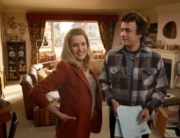The lush, soothing greens that populate the visual palate of Mahalia Belo’s feature debut is an interesting, paradoxical choice for a somber climate change/survivalist tale, set presumably in the present day, or perhaps only a few years or so into the future. A sleepy pallor hangs over the movie—a soft sonic and visual approach to the natural world versus the chaos and violence caused by humans.
The main protagonist, pregnant Woman (Jodie Comer), readies a bath as a rainstorm rages on outside her London townhouse. (As if emphasizing their diminished statures, none of the other main characters are given full names, just letters.) The soil in the garden outside is soaked, and the electricity fizzles out. As she starts going into labor, water begins to seep in and flood the ground floor. She later gets to the hospital and safely delivers the baby. As if happening simultaneously, the film cuts from the hospital to the raging flood waters crashing through the windows of her home. The symbolic motifs of water, the embryo, birth, and rebirth that materialize throughout are occasionally a bit precious.
With her newborn and her husband, R (Joel Fry), the three embark out of the chaos of a flooding city into the countryside where R’s parents reside. What’s particularly eerie is that the characters, with their lack of heated emotional reactions to the dire weather and news reports on the radio, seem to be somewhat acclimated to crisis. However, desperate people and sudden acts of violence (much of which is off camera), plus the increasing inadequacy of government and military aid to provide shelter, safety, and food, are just some of the reasons why R abandons Woman and baby Zeb. Following the classic template of the hero’s journey, Woman ultimately takes her child upon an odyssey with hopes of returning home.
As a result of a lot of whispery conversations and moody far-off stares, there is a lack of a distinctive hook in Woman’s character—the role doesn’t give Comer, an excellent actress, much to work with nor much for a viewer to engage with. Perhaps the story is more compelling as a novel, following the psyche and tensions of Woman’s trek more internally instead. The film perks up a little in a refugee camp when Woman meets O (Katherine Waterson), a fellow new mother, who reveals a subtly spunkier presence and attitude. A few other strong actors appear, including Benedict Cumberbatch and Gina McKee, but their characters feel somewhat inconsequential.
Still, there are some inspired directing choices from Belo and nice edits by Arttu Salmi—the blowing of an eyelash from a fingertip cuts to the sound and visuals of the rolling sea. Flashbacks of Woman and R in their first meetups in warmer, cheerier times are intermixed well with the present action. Anna Meredith, who provided the unique electronic score for Eighth Grade—making a pool party scene both funny and terrifying—provides a straightforward, broody synth score here.
If the film comes off somewhat wanly, it may be because its story patterns similar survivalist sagas (one may think of mid-2000s works like Children of Men and The Road). Yet its depiction of climate change—the submerged roads and panicked, displaced masses—is chilling and realistically captured. As a character notes, “What you miss doesn’t exist,” an unsettling statement in the wake of ongoing environmental destruction.

















Leave A Comment